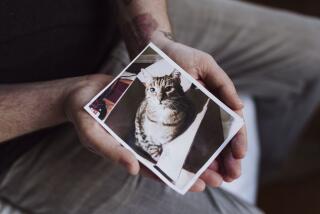Grief Is OK When You Lose a Pet
- Share via
There is no cure for grief. It is a reservoir of love, with nowhere to flow. It is a total disconnect from the beloved cat (dog, bird, rabbit, horse) with whom you have shared your life. When a cherished animal dies, the loss can overwhelm you despite all attempts to cope.
If you are like most humans, you may be slightly embarrassed by all this. “Am I crazy, or what?” asks the grief-stricken person who still breaks into tears months after the event--or who continues to “see” the departed animal playing in the garden or curled on the bed. Months or years may pass, but the sense of sadness and loss, the desire to be close to that adored animal, does not lessen as one might expect.
You are not “crazy” and you should not be embarrassed, pet-grief experts agree. Many humans feel the same sense of bereavement for lost pets as they do for people who die.
“From a psychological point of view, there is no difference between the loss of an animal companion and a human companion for those who have very strong bonds with their pets,” says Dr. Lorri Greene, a licensed psychologist and pet-grief therapist in San Diego. Her statement alone is enough to make some people cringe. They don’t believe in inter-species grief. They don’t want to hear about your sadness, or your departed four-footed friend. “Get over it; it was just a pet,” they say.
But experts across the country who deal with pet loss say there is no way to “get over it” unless you openly express your feelings, and determine to honor the memory of your pet. This might be done by a formal or informal memorial service, in which you and your friends or family give thanks for the pet’s life and share memories. Or it might be done on the Internet, where many “rooms” are set up for people to discuss their grief and their love for pets who have died.
Grief experts also say there is almost always a feeling of guilt when you lose a pet: Did I do too little? Too much? Was he in pain? Should I have euthanized her sooner? Later? Should I have borrowed money to get better medical care?
Basically, it’s a feeling that the pet may have died because of something you did or did not do. Sometimes, that feeling is accurate. And that, too, should be faced, the experts agree. Author Susan Chernak McElroy, suggests you make a written or spoken “vow” to the pet who has died: From now on you will take better care of animals in your life. You will check for medical problems sooner, try to get more prompt care, keep the gates locked so your pets can’t get out, and do more good deeds for other animals in his or her memory. Those are active, positive ways to help assuage grief, McElroy and others agree. No matter what your feelings, the most important thing you can do is connect with others who will understand and share your loss. Here are some sources for help:
The Delta Society: For a free list of books on pet loss, call (800) 869-6898 and ask for “pet 400.” An Internet Web site, https://www.deltasociety.org, offers a complete list of pet-loss telephone hotline numbers and pet-grief counselors throughout the U.S., along with information about services provided by each.
Assn. for Pet Loss and Bereavement: Offers full information on grief counseling around the country at https://www.aplb.org.
Pet Loss Grief Support Web Site & Ceremony: This Web site, https://www.petloss.com, offers group meetings, chat rooms, poetry and tribute pages for pets who have passed away.
Rainbow Bridge: A Web site, https://www.rainbowbridge.com, that helps bereaved pet owners find comfort through chat rooms, personal tributes they write about their pets and other healing measures.
“Preparing for the Loss of Your Pet,” by Myrna Milani (Prima Publishing, 1998): Offers information about pet grief and all aspects of pet death.






